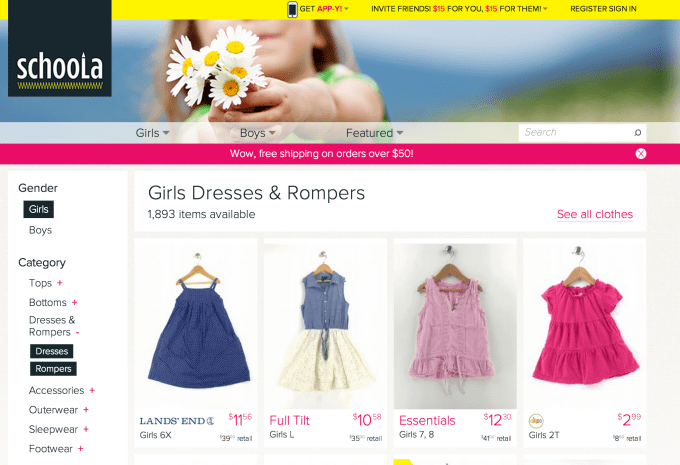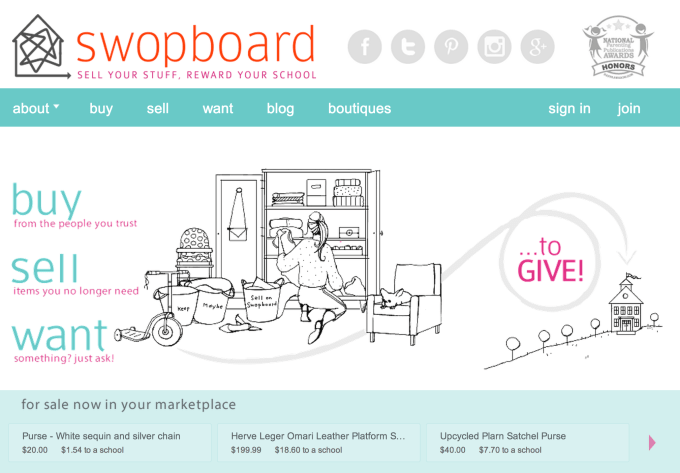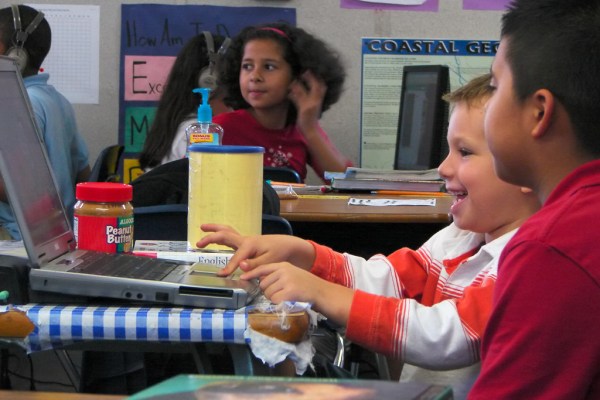There are a number of startups catering to those who want to buy and sell “gently used” clothing and other items online, whether directly to fellow consumers as on Threadflip and Poshmark, for example, or with a company acting as middleman and curator, like thredUP, Twice, TheRealReal, and elsewhere.
But a couple of companies want to take things a step further. Instead of simply putting a little change in your pocket (and theirs), these services will also donate some percentage of the proceeds from each sale to your child’s school.
Schoola
San Francisco-based Schoola was founded in 2012 by Stacey Boyd, a parent, former teacher and school principal, and also the creator of the The Savvy Source, an online community that provides parents with ratings, reviews and information on preschools, camps, events and advice. She saw first-hand how hard it was to get funds to support programs like art, P.E. and foreign languages in schools, and how easily those programs were cut.
Launched initially as an online clothing drive, with proceeds going back to the local school, the company has since grown to support over 3,000 schools across the U.S. Like many services, users request a “clean out bag” from the site, fill it with used (but still quality) clothes and drop it into the mail, postage paid.

After being listed and sold (at up to 90 percent off retail), 40 percent of the proceeds are then donated directly to your child’s school. Today, the company tells us their catalog includes tens of thousands of boys and girls clothing from brands like Gap Kids, DKNY Klein, Justice and more. The clothing sizes range from preschool-aged through those for teenagers.
Earlier this spring, Schoola also made its move to mobile, with a new iOS 7-friendly iPhone application that lets parents request bags, arrange pick-ups, and shop from their phones.
Schoola is backed by $12 million in funding from Softbank.
Swopboard
Seattle area startup Swopboard is slightly newer, having launched first in its hometown in November 2013, and then nationally in January.
Like Schoola, the motivation behind the service comes from a mother – this time, single mom of two Natalie Angelillo, also previously a VP at PhotoDisc and Getty Images, and serial entrepreneur herself. The idea in her case grew out of necessity, with her children quickly growing out of clothing, as kids tend to do. Plus, she was interested in the “green living” aspects to reselling clothes online, and wanted to do some good with the proceeds, too – specifically tackling the challenges with school fundings.

Unlike Schoola, however, Swopboard doesn’t get involved in sorting through or posting the goods for sale itself, but takes the Poshmark/Threadflip/eBay-like approach of letting buyers and sellers connect directly with each other and set their own prices. Items are listed on the site for free, then a PayPal fee and Sales fee ($1.99-$7.99) is deducted from the sale.
Additionally, a 10 percent minimum donation is subtracted from the net proceeds of the sale and sent to the school of your choice. If you don’t specify a school, Swopboard donates to Boys and Girls Club instead. However, parents can set the donation amount higher than 10 percent, we’re told, and the average donation is actually 46 percent.
More importantly, while Schoola is focused on reselling kid’s clothing, Swopboard supports a broader list of categories, including gear and gadgets, home goods, pet items, furniture, jewelry, collectibles, textbooks, toys and more. The company also offers “SwopBoard Boutiques,” which are private collections from select partners, like the Seattle Design Foundation or indie designers. Each private collection partner gives 10 percent of the sale to the buyer’s school of choice.
The company has raised $1 million in seed funding from angels in the Seattle and Bay Area.
